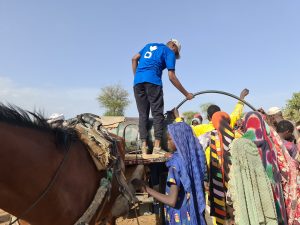

Your browser is not up to date.
If you wish to view the Action Against Hunger website correctly, update your browser.
Find the latest versions of supported browsers listed below.
No matching results…
No results seem to match what you are looking for, please modify your search.
 © Caleb Taryanouba pour Action contre la Faim
© Caleb Taryanouba pour Action contre la Faim
Headline
Since the start of the conflict in Sudan on 15 April, more than 378,000 Sudanese and almost 48,000 Chadian returnees have fled to Chad and found refuge in the east of the country.
The massive influx of these people and an insufficient humanitarian response are putting a strain on already fragile basic services. Living conditions are continuing to deteriorate. Action against Hunger is working in the provinces of Ouaddai and Sila and is warning that the crisis is worsening.
The town of Adré in Ouaddai province is home to more than 207,000 refugees. That is four times more than its usual population. Despite the humanitarian response, the town is engulfed in tents and makeshift shelters, and basic services are completely overwhelmed. The situation is catastrophic on every front: health, nutrition, shelter, access to water and sanitation, mental health, epidemic risk and food security.
At a time when the rainy season is in full swing and the relocation of refugees is slowing down, funding for the humanitarian response is only 34%. This is not enough; predictions are that there will be 600,000 refugees by the end of 2023. Even today, nearly 2,000 people are fleeing Sudan and crossing the border every day.
At the Lycée refugee site, where people are waiting to be relocated to official camps, round shelters made of branches and tarpaulins are crammed into the smallest available square centimetre. Families are sleeping by the dozen in the shelters, in deplorably unhygienic conditions.


“The sun has torn the tarpaulins they gave us. When the rain starts, we can’t even sleep. The children and we get up and stand until the rain stops,” says Hawati, a mother of two. Aziza, for her part, shows her shelter where she sleeps on the floor with 9 members of her family, a torn veil acting as a door.
The overcrowding and lack of access to sanitation are worsening the health situation in the households and raising fears of epidemics such as cholera. Despite the efforts of the local authorities and humanitarian partners, access to clean drinking water is a challenge at the site. Families only receive 5 litres of water per person, far from the recommended 15 litres per day.
For Aziza, it is a daily struggle: “I have problems with water because to transport water, we get up at 6 am and come back at 12 pm because we have to queue. Look at how we’re living, we’ve left all our things back home. We’re really suffering. Even the latrines are only a small hole. Little children can’t use them, they go outside and that causes illness.”
Acute respiratory infections, watery diarrhoea and malaria remain the three most frequent pathologies. At the same time, a rate of 28% of global acute malnutrition¹ was detected among the children screened under the age of five. To support the health services in Adré, alongside other organisations, Action against Hunger has set up a mobile clinic at the Lycée site and a therapeutic nutritional unit (UNT) at the town’s hospital to treat children suffering from severe acute malnutrition without and with medical complications. In addition to treatment, awareness-raising campaigns on good hygiene and care practices are being carried out in the communities, and community relays have been trained to detect and screen for malnutrition.
Aminata Zoubeirou Mahaman is head of the nutrition and health programme at Action against Hunger. While 100% of the children currently being cared for are refugees, she is concerned about the impact on the host communities, whose food security is steadily deteriorating. “The children who come to us at the UNT are really in a critical state. Some are very exhausted from having travelled long distances on their mothers’ backs to seek refuge. At the same time, food prices are rising, which can lead to malnutrition not just among the refugee children who arrive: even the locals are at risk.”
The issue of access to food, coupled with inflation, is affecting refugees and locals alike. The disruption of cross-border trade between Sudan and Chad has led to a 3-fold increase in the price of foodstuffs on the markets. “A bag of millet, which used to cost 12,000 CFA francs before the crisis, now costs 40,000,” says Aminata. That’s an increase from €18 to €60.
In addition to economic insecurity, the lack of prospects for the future and the deplorable living conditions are having an impact on the psychological state of the Sudanese refugees, who have already been severely affected by the violence they suffered in their own country and during their flight. “These are people who arrive with a lot of needs, they want to be listened to, they are disturbed, and you can see the stress in a visible way”. Explains Aminata. “We do our best with our facilitators to lighten the mood a bit, to give a little hope, but there’s still a lot to be done when it comes to mental health.”
Action against Hunger is calling on financial partners to respond to the humanitarian emergency in Eastern Chad, in order to strengthen the response to improve the living conditions of refugees, returnees and vulnerable host populations in the areas of nutrition and health, water, sanitation and hygiene, mental health, shelter and food security.
Our teams are working in the Ouaddai and Sila provinces in the health and nutrition sectors, as well as in water, hygiene and sanitation. Technical implementation activities and nutritional care are accompanied by awareness-raising and training sessions.
¹UNHCR, Chad Sudan emergency, weekly update, 18th August 2023
Chad
All the news of our Action: articles, events, testimonials, press releases…